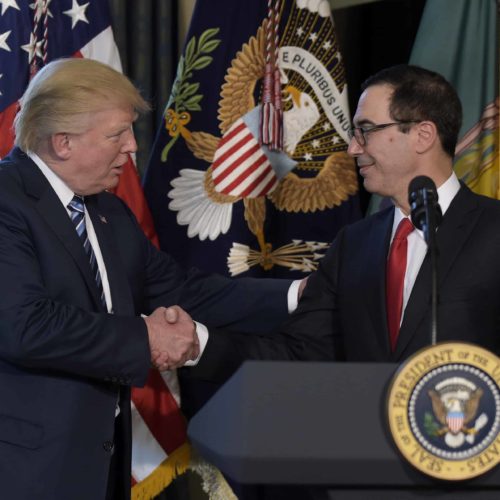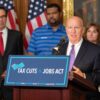Introduction
“The rich will not be gaining at all with this plan.”
That’s what President Donald Trump assured America on Sept. 13, 2017, as the Republican tax bill was being drafted. His views were echoed on several occasions by Treasury Secretary Steven Mnuchin.
But more than a year after the tax bill was signed into law, it is becoming abundantly clear that the main benefits of the tax act actually do fall squarely on the rich. Among the obvious:
- For taxable income above $600,000, rates were cut by 2.6 percentage points, from 39.6 to 37 percent. That would save a person with $2 million in taxable income $36,400 in taxes.
- Business owners in several fields, including real estate, who take their income through limited liability companies, or LLCs, and other structures can now take 20 percent off the top of their earnings before they’re taxed, saving them more than $400 billion over 10 years. President Trump is said to have about 500 such businesses.
- The exemption on estate taxes doubled from $11 million to $22 million, a 10-year $83 billion windfall for the rich who die, and even for those who live if they know how to game it.
The less obvious benefit, however, is the centerpiece of the tax bill: the astounding cut in the corporate income tax rate, from 35 percent to 21 percent. That was designed to reduce corporate taxes by $1.38 trillion over 10 years. The savings would be a sure-fire way to boost the economy and put money in workers’ pockets, said Mnuchin and other administration and GOP leaders. Neither scenario has yet panned out. But it certainly has put more money in the pockets of the wealthy.
Here’s how: One of the biggest benefits the tax law gives the rich comes not from decreased taxes, but from increased income. Dana Trier, the tax expert hired by Treasury in 2017 to oversee the writing of the tax bill, said he was dismayed to see Congress enact the steep and immediate corporate rate cut because it “rewards old capital,” that is, the existing shareholders of corporations.
Coincidentally, these shareholders are also the wealthiest people in America. New York University economist Edward N. Wolff, in a 2017 paper, determined that 84 percent of all stocks are owned by the wealthiest 10 percent of American households.
Companies received a windfall from the corporate tax rate cut of $150 billion in 2018, according to the nonprofit corporate analyst Just Capital. That caused profits to grow, which allows companies to increase dividends. Higher profits also boost a company’s share price. The extra cash also allowed companies to buy back their own shares from the marketplace, reducing the number of outstanding shares and making each share worth more. Even without dividends, shareholders saw their share values increase, adding to their wealth. And corporate CEOs’ compensation will go up too, because it typically is tied to share value.
Indeed, 2018 saw record increases in dividends and record numbers of buybacks. In the third quarter, S&P 500 companies paid out a record $13.66 a share, handing $115.7 billion to shareholders. In the first half of 2018, buybacks jumped by nearly 50 percent when compared with the previous year. Goldman Sachs estimated that corporations spent $770 billion on buybacks in 2018 and will spend $940 billion this year.
Ironically, Trier said, it took a long time for Mnuchin, who was his boss, to grasp this trickle-down effect. Mnuchin frequently insisted in interviews and to Congress in 2017 that the tax bill would not benefit the rich.
“As I’ve said all along, the objective of the president is that rich people don’t get tax cuts,” Mnuchin said Oct. 1, 2017, on This Week with George Stephanopoulos.
“As I’ve said all along, the objective of the president is that rich people don’t get tax cuts.”
steve Mnuchin on This Week with George Stephanopoulos, Oct. 1, 2017
Treasury did not respond to requests for a response from Mnuchin.
According to Trier, Mnuchin sincerely did not want the tax bill to benefit the wealthy, and he genuinely believed it would not. Shortly after Trump chose him as treasury secretary, on Nov. 30, 2016, Mnuchin told CNBC, “There will be no absolute tax cut for the upper classes,” a pledge that came to be known as the “Mnuchin rule.”
Even tax analysts at Treasury couldn’t sway Mnuchin. He repeatedly ordered Treasury number crunchers to run tests on the proposed bills to see who would benefit, “and every time he found out the rich people were benefiting, he was just in a state of complete dismay,” Trier said.
“I would wince [and think,] ‘Somebody is going to have to teach him over time,’” Trier said. “You just can’t make the legislative changes that they were talking about without it benefiting the rich.”
The better solution, Trier said, would have been to phase in the reduced corporate rates over the years. That way the wealthy wouldn’t receive an immediate windfall, while the prospect of lower rates would attract an influx of new corporate investment.
Apparently, Mnuchin learned, or at least came to face the reality of a cut in the corporate tax rate. On Oct. 18, 2017, he told Politico, “So when you’re cutting taxes across the board, it’s very hard not to give tax cuts to the wealthy.”
Trump, however, was not so ready to change his tune. On Nov. 29, as the bill was heading toward a Senate vote, he said in a speech in St. Louis, “This [bill] is going to cost me a fortune.”
His statement was widely disputed by tax experts.






Join the conversation
Show Comments
At least 90% of Americans would be opposed to such obvious enrichment of just a small group of already wealthy. Why is this not front page news – consistently with stories of middle class and working people struggling financially no matter how hard they try.
This is shameful and seems to be the core philosophy of many Republicans.